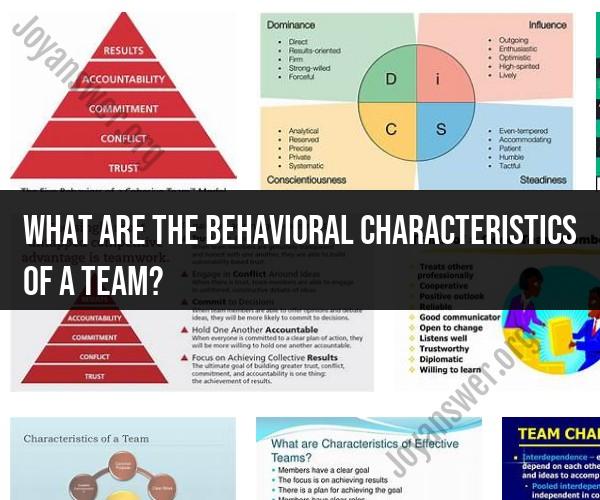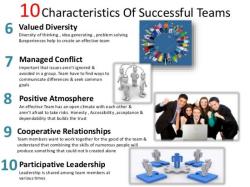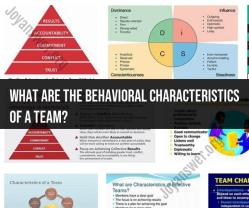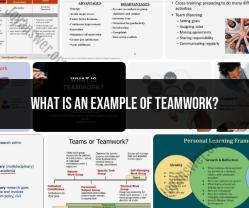What are the behavioral characteristics of a team?
Effective teams often exhibit specific behavioral characteristics related to collaboration and communication. These characteristics contribute to their success in achieving goals and fostering a positive team dynamic. Here are some key behavioral characteristics of effective teams in these areas:
Collaboration:
Shared Goals: Effective teams have a shared understanding of their goals and objectives. Team members are aligned with a common purpose, which motivates them to work together toward a collective vision.
Roles and Responsibilities: Team members understand their roles and responsibilities within the team. Each person knows what is expected of them and how their contributions fit into the larger team effort.
Diverse Skill Sets: Effective teams often consist of individuals with diverse skill sets and expertise. This diversity allows the team to approach problems from multiple angles and find creative solutions.
Open-Mindedness: Team members are open to new ideas and perspectives. They encourage creativity and innovation by valuing different viewpoints and approaches to problem-solving.
Conflict Resolution: Effective teams have mechanisms in place for resolving conflicts constructively. Disagreements are seen as opportunities for growth, and the team works together to find compromises or solutions.
Communication:
Active Listening: Team members practice active listening, paying full attention to what others are saying without interrupting. They seek to understand before being understood.
Effective Verbal and Non-Verbal Communication: Clear and concise verbal communication is essential in effective teams. Additionally, non-verbal cues, such as body language and facial expressions, are also considered to ensure that messages are understood correctly.
Regular Updates: Teams maintain open and regular communication channels. They provide updates on progress, share information, and seek feedback to ensure everyone is informed and aligned.
Constructive Feedback: Team members provide constructive feedback to one another. This feedback is specific, focused on behavior or performance, and aimed at improvement rather than criticism.
Transparency: Effective teams practice transparency by sharing relevant information openly. They are honest about challenges, risks, and opportunities, which builds trust among team members.
Use of Technology: Teams leverage communication tools and technology to facilitate collaboration, especially in today's global and remote work environments. This includes video conferencing, project management software, and instant messaging platforms.
Meetings with Purpose: When meetings are necessary, effective teams ensure that they have a clear purpose and agenda. Meetings are well-organized and efficient, and action items are documented and followed up on.
Cultural Sensitivity: In diverse teams, members are culturally sensitive and respectful of different communication styles and norms. This fosters a more inclusive and harmonious team environment.
Conflict Resolution Skills: Effective teams are skilled in resolving conflicts through open and constructive dialogue. They address conflicts promptly to prevent them from escalating and negatively affecting team dynamics.
Active Engagement: Team members actively engage in discussions and decisions. They contribute their ideas and perspectives, and they encourage quieter members to do the same.
These behavioral characteristics of effective teams in terms of collaboration and communication create a positive team culture, enhance problem-solving abilities, and contribute to overall team success. By focusing on these aspects, teams can build stronger relationships, work more cohesively, and achieve their goals more efficiently.





